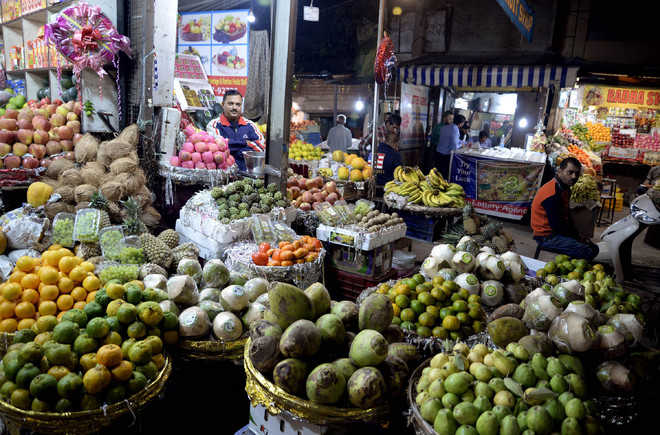Rachna Khaira
Tribune News Service
Jalandhar, November 9
The demonetisation of Rs 500 and Rs 1,000 currency notes last night by Prime Minister Narendra Modi may flush out black money from the Indian market in the long run, it has however gave a golden opportunity to small-time vendors to earn some quick bucks by accepting banned currency notes and foreign currency at almost half their value.
While Rs 500 notes were found to have been selling for mere Rs 250, the other Rs 1,000 note was found to have been selling at Rs 700 only. Due to the ongoing NRI season in Doaba, many shopkeepers even took loose foreign currency from their NRI customers at almost half its rate.
According to Amandeep Deol, a US-based NRI, she along with her family came on Tuesday and got Indian currency worth Rs 1 lakh in the denomination of Rs 500 and Rs 1000. “I can only exchange them once banks will open tomorrow. As I had to attend a wedding tonight, I did most of my shopping by paying US dollars at almost half of its value.” she said.
Though black marketing of Rs 100 notes came from various areas, including, Ladowali road, major transaction of foreign currency was reported in the Model town area.
While a cigarette vendor in the main Model town market was caught exchanging Rs 500 note for a mere Rs 250 and Rs 1,000 note for Rs 700 only by the jalandhar Tribune team, another departmental store was also reported to have offered the same deal to its customers on the Ladowaali road.
As per sources, foreign currency worth lakhs of rupees were doled out in the open market on a single day.
A majority of their customers includes women and small-time street vendors who despite having an account opened under Jan Dhan Yojana were found to be ignorant of the fact that high denomination rupees could be exchanged in their respective banks and post offices after two days.
“I had worth Rs 3,500 high denomination notes by selling vegetables yesterday. I got it exchanged for mere Rs 2,350 by a shopkeeper,” said Ram Sahay, a vegetable vendor. Though he admitted that he had a bank account, he claimed ignorance of the fact that he could get it exchanged from there.
Car dealers accept denominations
As 70 per cent of the sale of two and four-wheelers is majorly being done by people from rural areas with cash only, a major impact of the demonetisation was expected in the sales of cars and two-wheelers in the city. However, investigations revealed that while some refrained from taking high denomination notes from the customers, a majority of them given vehicle deliveries that were due today by accepting cash in the denominations of Rs 500 and Rs 1,000 also.
Patients major sufferers
The major sufferers among the general public were patients and their attendants who came from far-flung places. Though the Centre has allowed hospitals to accept high-denomination currency for up to 72 hours, a majority of the hospitals refrained from getting into trouble of exchanging it later with at banks. Hence, they asked them to either pay through a credit or debit card or else make an RTGS transaction. However, allied medical services, including hospital canteen and pharmacy shops, have refused to accept the banned currency, causing a lot of harassment to the patients.
“We came here last night as my son slipped and fell down from the staircase. He suffered a major injury in his ankle. I could not arrange breakfast for us as the canteen and even vendors outside too have refused to accept the notes,” said Harjit, a farmer. He later had to get food made from his home by one of his kin.
Unlock Exclusive Insights with The Tribune Premium
Take your experience further with Premium access.
Thought-provoking Opinions, Expert Analysis, In-depth Insights and other Member Only Benefits
Already a Member? Sign In Now










